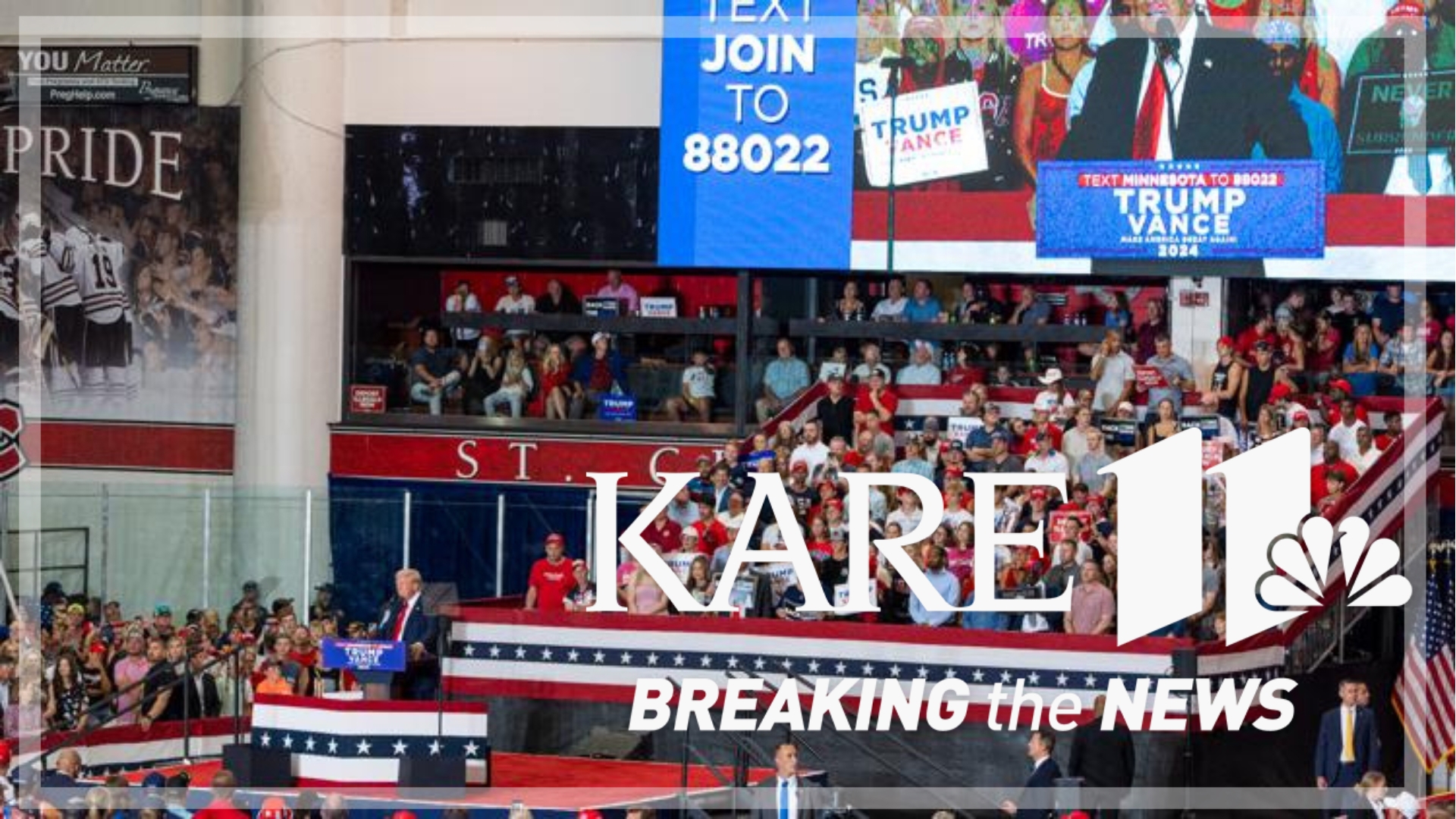ST. CLOUD, Minnesota — When former President Donald Trump campaigned in St. Cloud in July, it brought more than 8,000 supporters inside the National Hockey Center at St. Cloud State University and more crowds outside.
It also brought more than $200,000 in city services that the city of St. Cloud is trying to get reimbursed from the Trump campaign.
"I'm not but if I was running for re-election and I had a cost of a rally that I did that was well over $200,000 for the city, I'd feel an obligation to pay the city. And so I would do that," said St. Cloud Mayor Dave Kleis.
Kleis was first elected mayor of St. Cloud in November 2005. Prior to that, he served in the Minnesota State Senate for a decade as a Republican.
Kleis said the first invoice was sent to the Trump campaign in September. After 30 days passed without hearing from anyone with the campaign, the city sent a second notice last Friday.
The invoice description includes "Police Department: $63,267.81; Public Services: $60,510.07; Construction Change Order: $61,878.84; Fire Department: $21,420.74; and IT Department: $1,857.71." In total, the invoice is for $208,935.17.
Kleis said they were notified of the rally less than a week before it took place.
"It was... a pretty quick turnaround and you don't know those costs until it's over because Secret Service requires a lot of the changes," Kleis said.
For example, one of the larger costs involved opening a roundabout that had been closed for construction.
An NBC News report claims at least four cities and a county are still waiting to be reimbursed by the Trump campaign — seeking more than $750,000 in unpaid bills for campaign events since 2016.
The TEGNA Verify team said it's unclear, however, whether Trump is legally obligated to pay all of them.
The Center for Public Integrity reported in 2019 that in some cases, there weren't any signed contracts with the campaign which makes the bills difficult to collect.
A Trump campaign official claimed to KARE 11 that the "U.S. Secret Service is responsible for local law enforcement and first responder costs."
Kleis said if the Trump campaign does not pay up after this second notice which lasts another 30 days, they will then bill the Secret Service.
But Secret Service Spokesperson Nate Herring told KARE 11:
"State and local law enforcement play a crucial role in our ability to effectively conduct our protective operations. Currently, the U.S. Secret Service lacks a mechanism to reimburse state and local governments for their support during protective events. In recent discussions with Congressional leaders, we've identified this as a critical need, given the essential role our police and public safety partners play. We are grateful for the additional resources provided in the recent Continuing Resolution, and we will continue to work with the Administration, the Department of Homeland Security and Congress to advocate for the necessary grants and resources to support the city, county, and state law enforcement and public safety agencies that assist us every day."
Trump isn't the only one cities are seeking reimbursement from. NBC reports that the Spokane mayor claims Bernie Sanders' campaign still owes the city about $33,000 and Hillary Clinton's camp owes a little less than $3,000.
The city of Minneapolis had a dispute with the Trump campaign following his 2019 rally at Target Center. Mayor Jacob Frey tried charging Trump's campaign more than $500,000 for city services. Ultimately, the city reached a settlement with the operators of Target Center who agreed to pay the city $100,000.
The city told KARE 11 that the last payment was processed at the end of last December.
Kleis said they have hosted campaign visits in the past but without extra costs.
"Previously, the city administration did something very similar billing to George W. Bush at that time. That was in 2004 and that was for cost above and beyond. We've had campaign visits but we wouldn't charge for anything that we would have as routine, people that are already working. These are above and beyond costs," Kleis explained.
The July attempted assassination of Trump happened just two weeks before his visit to St. Cloud.
Kleis on security said, "in the last year, those costs have gone up just based on the fact that there's an assassination attempt that increased the amount of security that was used."
Kleis said while the White House is not billed for official events, campaign stops are treated the same as any other event that requires city services. Kleis also said they will not compromise on public safety.
"We do have an obligation... for our taxpayers to, when there are costs that go above and beyond, to have somebody that is held responsible for that," Kleis said. "That's what we're doing."

